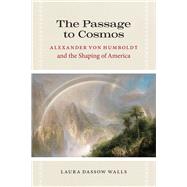The Passage to Cosmos
, by Walls, Laura Dassow- ISBN: 9780226871837 | 0226871835
- Cover: Paperback
- Copyright: 11/15/2011
Explorer, scientist, writer, and humanist, Alexander von Humboldt was the most famous intellectual of the age that began with Napoleon and ended with Darwin. With Cosmos, the book that crowned his career, Humboldt offered to the world his vision of humans and nature as integrated halves of a single whole. In it, Humboldt espoused the idea that, while the universe of nature exists apart from human purpose, its beauty and order, the very ideaof the whole it composes, are human achievements: cosmos comes into being in the dance of world and mind, subject and object, science and poetry. Humboldt's science laid the foundations for ecology and inspired the theories of his most important scientific disciple, Charles Darwin. In the United States, his ideas shaped the work of Emerson, Thoreau, Poe, and Whitman. They helped spark the American environmental movement through followers like John Muir and George Perkins Marsh. And they even bolstered efforts to free the slaves and honor the rights of Indians. Laura Dassow Walls here traces Humboldt's ideas for Cosmosto his 1799 journey to the Americas, where he first experienced the diversity of nature and of the world's peoplesand envisioned a new cosmopolitanism that would link ideas, disciplines, and nations into a global web of knowledge and cultures. In reclaiming Humboldt's transcultural and transdisciplinary project, Walls situates America in a lively and contested field of ideas, actions, and interests, and reaches beyond to a new worldview that integrates the natural and social sciences, the arts, and the humanities. To the end of his life, Humboldt called himself "half an American," but ironically his legacy has largely faded in the United States. The Passage to Cosmoswill reintroduce this seminal thinker to a new audience and return America to its rightful place in the story of his life, work, and enduring legacy.







